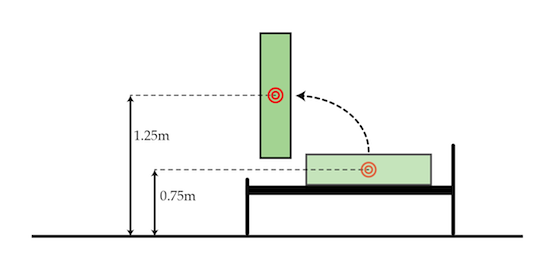Where's my cup of coffee
Climbing out of bed is sometimes hard in the morning. If you have a mass of 6 0 kg , what is the minimum amount of work in joules you have to do to get out of bed? Assume your center of mass when lying in your bed is 0 . 7 5 m above the floor, and your center of mass when standing is 1 . 2 5 m above the floor.

Details and assumptions
- The acceleration due to gravity is − 9 . 8 m/s 2 .
The answer is 294.
This section requires Javascript.
You are seeing this because something didn't load right. We suggest you, (a) try
refreshing the page, (b) enabling javascript if it is disabled on your browser and,
finally, (c)
loading the
non-javascript version of this page
. We're sorry about the hassle.
9 solutions
mgh = 60 X 9.8 X 0.5 = 294.
like it
Using the Formula of Gravitational Potential Energy , So We Have :
E p = m g h
m = M a s s
g = G r a v i t y
h = H e i g h t
h = 1 , 2 5 − 0 , 7 5 = 0 , 5
E p = 0 , 5 × 6 0 × 9 , 8 = 2 9 4
this is so easy
I was first not able to understand the question properly but now got it that we need to find the resultant work done = final work done - initial work done . that has been demonstrated by finding the difference of the given hights . well solved !!
the energy required to get up is the work done in getting up.. thus w=fXs...i.e forceXdisplacement... force=60X9.8=588 displacement=let us asume a quadrant axis thus on bed center of mass is (0.75,0) on standing center of mass is (1.25,0)... thus the displacement i.e x2-x1=1.25-0.75=0.5 workdone=588X0.5=294
we will use here formula:-(mgh) h=difference in center of mass =60 9.8 (1.25-0.75)=294
We all know that F=M A.Mass is already given n that is 60kg.Acceleration due to gravity is -9.8m/sec^2..Displacement = 1.25m-0.75m =0.50m.Work done =f s...
Diketahui = m = 60 kg s = 0.5 m (1.25-0.75) g = 9.8 m/s2 Ditanya = W...? Jawab = W = F.s
F= m.a F= 60 x 9.8 F= 588 Newton
W= F.s W= 588.05 W= 294 Joule
First, we must convert mass in to weight in Newtons (or force) by multiplying 60kg by 9.8 m/s^2 . This gives 588N. Next, given that work= force x distance, we use this value to multiply by 1.25m to give 735 J, and doing the same with 0.75m we get 441 J. Finally, we subtract 441J from 735J to get our answer: 294J.
You use Law of conservation of energy : Delta W = m . g .(h1 - h2 ) = 60 x 9,8 x 0,5 = 294 (J)
the formula for computing the work done is W=fd. for 'f' we have f=mg (m=60kg and g=9.8) f=588 now we fine distancd 'd' d=1.25-0.75=0.5 hence w=294